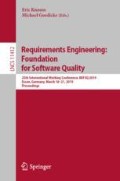Abstract
[Context & Motivation] Providing requirements-driven information (e.g., requirements volatility measures, requirements-design coverage information, requirements growth rates, etc.) falls within the realm of the requirements management process. The requirements engineer must derive and present the appropriate requirements information to the right internal stakeholders (IS) in the project. [Question/Problem] This process is made complex due to project-related factors such as numerous types of ISs, varying stakeholder concerns with regard to requirements, project sizes, a plethora of software artifacts, and many affected processes. However, there is little guidance in practice as to how these factors come into play together in providing the described information to the ISs. [Principle ideas/results] Based on analyzed data from an action research (AR) study we conducted in a large systems project in the rail-automation domain, we propose a meta-model that consists of the main entities and relationships involved in providing requirements-driven information to internal stakeholders within the context of a large systems project. The meta-model consists of five main entities and nine relationships that are further decomposed into three abstraction levels. We validated the meta-model in three phases by researchers and practitioners. [Benefits/Contribution] The meta-model is anticipated to facilitate: (i) control and management of process and resources for providing requirement-driven information to stakeholders and (ii) communication among internal stakeholders.
Access this chapter
Tax calculation will be finalised at checkout
Purchases are for personal use only
Notes
- 1.
High resolution images of Figs. 2 and 3 can be found at: http://publish.uwo.ca/~inoorwal/Uploads/Meta-Model_publish.pdf.
References
Buse, R.P.L., Zimmermann, T.: Information needs for software development analytics. In: International Conference on Software Engineering, Zurich, Switzerland, pp. 987–996 (2012)
Gross, A., Doerr, J.: What do software architects expect from requirements specifications? Results of initial explorative studies. In: 1st IEEE International Workshop on the Twin Peaks of Requirements and Architecture, pp. 41–45. IEEE, Chicago (2012)
Hess, A., DIebold, P., Seyff, N.: Towards requirements communication and documentation guidelines for agile teams. In: Proceedings of the 2017 IEEE 25th International Requirements Engineering Conference Workshops, REW 2017, pp. 415–418 (2017)
Doerr, J., Paech, B., Koehler, M.: Requirements engineering process improvement based on an information model. In: Proceedings of the IEEE International Requirements Engineering Conference, pp. 70–79 (2004)
Berenbach, B., Paulish, D.J., Kazmeier, J., Rudorfer, A.: Software and Systems Requirements Engineering in Practice. McGraw Hill, New York City (2009)
Wiegers, K.E.: More about Software Requirements: Thorny Issues and Practical Advice. Microsoft Press, Redmond (2006)
Sarkar, P.K., Cybulski, J.L.: Aligning system requirements with stakeholder concerns: use of case studies and patterns to capture domain expertise. In: Australian Workshop on Requirements Engineering, pp. 67–82 (2002)
Hassan, A.E., Hindle, A., Runeson, P., Shepperd, M., Devanbu, P., Kim, S.: Roundtable: what’s next in software analytics. IEEE Softw. 30, 53–56 (2013)
Costello, R.J., Liu, D.-B.: Metrics for requirements engineering. J. Syst. Softw. 29, 39–63 (1995)
Berenbach, B., Borotto, G.: Metrics for model driven requirements development. In: Proceedings of the 28th International Conference on Software Engineering - ICSE 2006, Shanghai, China, pp. 445–451 (2006)
Susman, G., Evered, R.D.: An assessment of the scientific merits of action research. Adm. Sci. Q. 23, 582–603 (1978)
Basili, V., Heidrich, J., Lindvall, M., Munch, J., Regardie, M., Trendowicz, A.: GQM^+ strategies – aligning business strategies with software measurement. In: First International Symposium on Empirical Software Engineering and Measurement (ESEM 2007), pp. 488–490 (2007)
Noorwali, I., Madhavji, N.H.: A domain model for requirements-driven insight for internal stakeholders a proposal for an exploratory interactive study. In: 2018 IEEE 7th International Workshop on Empirical Requirements Engineering, pp. 32–36 (2018)
Monperrus, M., Beugnard, A., Champeau, J.: A definition of “abstraction level” for metamodels. In: Proceedings of the International Symposium on Workshop on the Engineering of Computer Based Systems, pp. 315–320 (2009)
Shaw, M.: Writing good software engineering research papers. In: International Conference on Software Engineering, vol. 6, pp. 726–736 (2003)
Runeson, P., Höst, M.: Guidelines for conducting and reporting case study research in software engineering. Empir. Softw. Eng. 14, 131–164 (2009)
dos Santos, P.S.M., Travassos, G.H.: Action research can swing the balance in experimental software engineering. Adv. Comput. 83, 205–276 (2011)
Humphrey, W.S., Kellner, M.I.: Software process modeling: principles of entity process models. In: Proceedings of the 11th International Conference on Software Engineering, pp. 331–342. ACM (1989)
Hess, A., Doerr, J., Seyff, N.: How to make use of empirical knowledge about testers’ information needs. In: IEEE 25th International Requirements Engineering Conference Workshops, pp. 327–330. IEEE Computer Society (2017)
Acknowledgements
We thank Philipp Hullmann and Eduard Groen for their valuable feedback. This work is supported by the Ministry of Education of Saudi Arabia.
Author information
Authors and Affiliations
Corresponding author
Editor information
Editors and Affiliations
Rights and permissions
Copyright information
© 2019 Springer Nature Switzerland AG
About this paper
Cite this paper
Noorwali, I., Madhavji, N.H., Arruda, D., Ferrari, R. (2019). Towards a Meta-model for Requirements-Driven Information for Internal Stakeholders. In: Knauss, E., Goedicke, M. (eds) Requirements Engineering: Foundation for Software Quality. REFSQ 2019. Lecture Notes in Computer Science(), vol 11412. Springer, Cham. https://doi.org/10.1007/978-3-030-15538-4_19
Download citation
DOI: https://doi.org/10.1007/978-3-030-15538-4_19
Published:
Publisher Name: Springer, Cham
Print ISBN: 978-3-030-15537-7
Online ISBN: 978-3-030-15538-4
eBook Packages: Computer ScienceComputer Science (R0)

